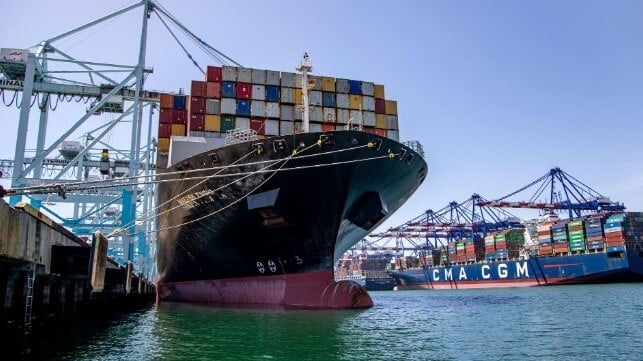Carriers Respond to Tariff Uncertainty With "Extreme" Blanked Sailings

The Trump administration's steep tariffs on Chinese goods have prompted carriers to deeply slash sailings on Asia-U.S. routes, a sign of plummeting bookings. So far, freight rate indexes have not collapsed, suggesting that the carriers are pulling out ships quickly enough that slot supply is dropping as fast or faster than the drop in demand.
According to consultancy Sea-Intelligence, carriers are expecting to cut planned sailing capacity for Asia-East Coast cargo movement by 42 percent during the week of May 5-11. Though this is not the same as a year-over-year decline - it represents a cut from carriers' baseline plans - it is still unusual.
"That is an extreme amount of capacity. This is something you typically only see after Chinese New Year for example when everybody also goes on vacation out of China," said shipping expert Lars Jensen on a podcast Monday. "So this is this is pretty extreme, to put it mildly."
The change appears to be driven by tariff calculations, as American importers attempt to sort out the best strategy for Chinese-sourced goods.
"The current political climate is extremely volatile and given that tariffs are being imposed and suspended on an almost daily basis, we assume that both the shipping lines and cargo owners are only adjusting their short-term supply chains for now and waiting for things to settle down (one way or another), before making longer-term network adjustments," said Alan Murphy, CEO, Sea-Intelligence in a statement April 16.
Tracking data firm SONAR suggests that ex-China container bookings are down 20 percent year-on-year for the month of April. Meanwhile, activity out of other regional manufacturing hubs - notably Vietnam - has been picking up as importers rush to get goods into the country ahead of the administration's new tariffs on all other trading partners.

that matters most
Get the latest maritime news delivered to your inbox daily.
The plummeting ex-China volume reflects the uncertainties of American importers, many of whom cannot afford a tariff of 145 percent on their goods. If Beijing and Washington can't reach a trade deal that lowers U.S. tariff barriers, "millions" of American marketing companies that rely on Chinese-sourced goods could go out of business - and may end up selling their brands to Chinese manufacturers, says Flexport's Ryan Peterson. Under this scenario, familiar Chinese-made goods would continue to arrive in the U.S. market, but with reduced overhead costs and full Chinese control.
Thousands, and then millions, of American small businesses, including many iconic brands, will go bankrupt this year if the tariff policies on China don’t change.
— Ryan Petersen (@typesfast) April 17, 2025
????
